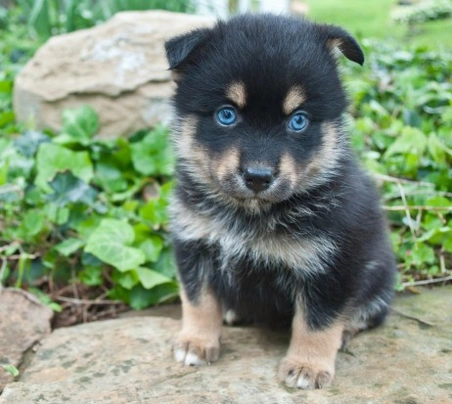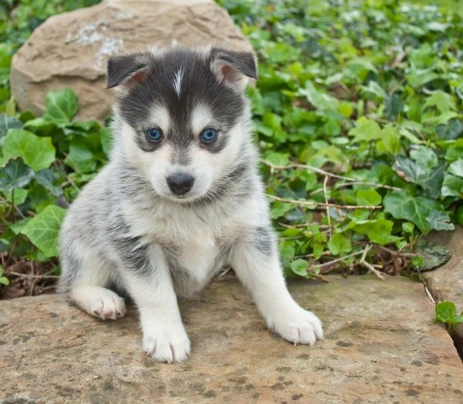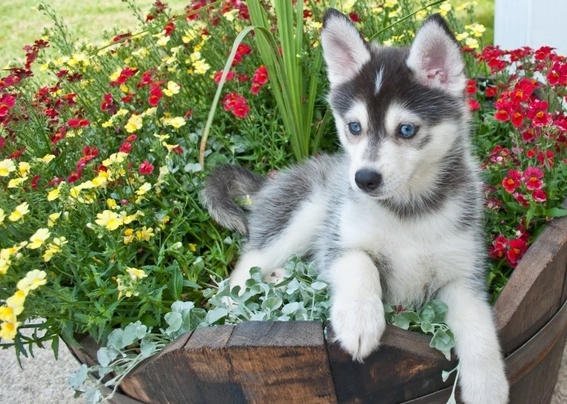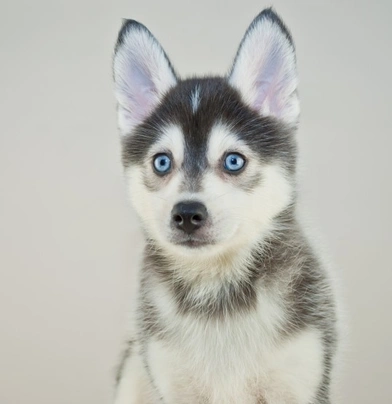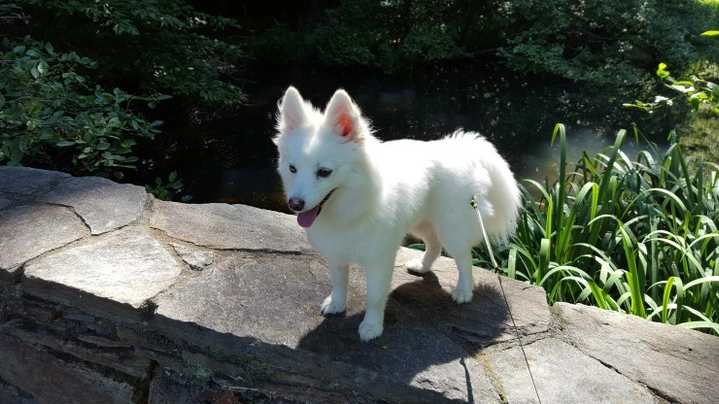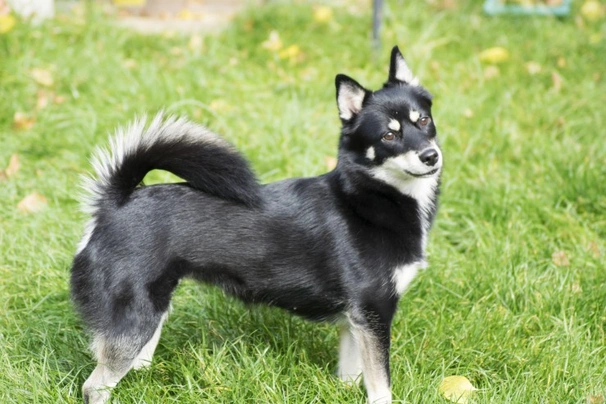Pomsky
Pros
Cons
Introduction of the Pomsky
The Pomsky is one of the newer so called "Hybriddogs" or cross breeds to appear on the scene and are today among some of the most popular companions and family pets both in the UK and elsewhere in the world too. The breed came about by crossing a Siberian Husky with a Pomeranian and these charming little dogs were an immediate hit thanks to their adorable looks and their kind and loving albeit often mischievous natures.
When it comes to looks and personality Pomskies can inherit traits from either of their parent breeds and puppies in the same litter can be quite different in appearance too. Pomskies are a good choice for first time dog owners and are known to be especially good around children which is another reason they have become such popular family pets.
History of the Pomsky
The Pomsky has only been around for twenty years or so having first appeared on the scene in America and Canada with both countries having now established their own breed clubs. However as yet the Pomsky is not recognised by official international breed clubs which includes The Kennel Club here in the UK (November 2017).
Siberian Huskies and Pomeranians are the parent breeds of the Pomsky and both boast being Spitz-type dogs. As such they share a common ancestry and this includes being similar in appearance and temperament traits they have passed on to the Pomsky. Although Pomeranians are now considered more as lapdogs their ancestors were larger working dogs first seen in the Arctic regions of the world.
Pomskies became popular very soon after they appeared on the scene not only in America and Canada but elsewhere in the world which is hardly surprising given their charming looks loyal affectionate natures and the fact they are that much smaller than the Husky yet larger than a Pomeranian. Today they are just as popular here in the UK with more breeders developing healthier dogs thanks to careful and selective breeding.
Interesting facts about the breed
- Is the Pomsky a vulnerable breed? No they have become one of the more popular cross breeds thanks to their kind natures and charming looks
- A Pomsky’s sire is a Pomeranian and their dam is a Siberian Husky to avoid birthing complications
- They come in lots of sizes but prospective owners should be careful when considering buying an extra small Pomsky because of the health issues associated with their size
- There are F1 F2 and F3 Pomskies around today but the healthiest tend to be First Generation dogs (F1)
Appearance of the Pomsky
Height at the withers: Males 25.4 - 38.1 cm Females 25.4 - 38.1 cm
Average weight: Males 9.0 - 13.60 kg Females 9.0 - 13.60 kg
Like most of the newer cross breeds that have appeared on the scene over recent years Pomskies come in a variety of shapes sizes and colours with some dogs looking more like a Husky whereas others inherit more of the Pomeranian's looks. As such how a Pomsky turns out is a bit hit and miss at the present time. Puppies from the same litter can be so different in looks and temperament but the one constant seems to be the fact they always inherit a good variety of Spitz-type traits which includes having pointy ears a nice curly tail as well as a long muzzle and thick luxurious coat.
When it comes to their coat the Pomsky can be a variety of colours which includes those seen in the Siberian Husky and the Pomeranian. With this said the most commonly seen colours and colour combinations often seen in the Pomsky are as follows:
- Brown
- Cream
- Grey
- Tan
However their colour combinations are countless but they are always striking especially as many Pomskies inherit the lighter coloured eyes of the Husky which contrasts so well with the colour of their coats more especially when they are darker. Another consideration is what generation a Pomsky happens to be and whether they are first second generation dogs.
Gait/movement
When a Pomsky moves they do so with great purpose and covering a lot of ground when they do. They are active and alert always giving the impression of being ready to take on the world.
Faults
Prospective Pomsky owners should be wary of any puppies or dogs that show any sort of exaggeration whether in their looks or conformation and that extra-small Pomskies often come with many health issues so they are best avoided. A responsible breeder would always ensure that puppies they produce are of a good size and conformation and would avoid breeding extra small dogs for these reasons. Males should have both testicles fully descended into their scrotums.
Temperament of the Pomsky
Much in the same way as a Pomsky's appearance can vary quite a lot depending on their parent's appearance so too can their temperament. However they are highly intelligent and extremely playful dogs by nature traits they share with both the Husky and the Pomeranian. They are usually confident outgoing characters which again are traits both their parent breeds are known to be but some Pomskies are more outgoing than others which is where early socialisation comes into its own because it helps a more nervous puppy accept things they would have shied away from.
Some Pomskies also inherit the "protective and guarding" instincts of the Pomeranian whereas others are a little more laid back. If a Pomsky shows a little too much of the "protective" side to their nature it's best to gently curb this when a dog is still young to avoid problems later on. Leaving things too late can make it harder to stop a dog from guarding things unnecessarily which includes their feed bowls toys and even the kids.
Providing a Pomsky is well socialised from a young enough age and their training starts early and is consistent these charming little dogs are a pleasure and great fun to have around which is why over the last 20 years or so they have remained one of the most popular cross breeds to appear on the scene.
Are they a good choice for first time owners?
Pomskies are a good choice for first time dog owners providing the people have the time to dedicate to an intelligent active dog and who don’t mind having a lot of shed hair lying around the home.
What about prey drive?
Pomskies can have a high prey drive and care should always be taken when and where a dog can run off the lead more especially if there is livestock or wildlife close by. Care should also be taken when they meet any animals and pets for the first time just to be on the safe side.
What about playfulness?
Pomskies have a very playful side to their natures and love to entertain and be entertained. They are known to be a little mischievous when the mood takes them and being so clever they quickly know what pleases and owner and how to get their way when the mood takes them. They thrive on playing interactive games and thoroughly enjoy taking part in many canine sports which includes agility.
What about adaptability?
Pomskies are highly adaptable and providing they are given enough daily physical exercise combined with as much mental stimulation to prevent boredom from setting in they are just as happy living in an apartment in town as they are living in a house with a garden in the country.
What about separation anxiety?
Pomskies form strong ties with their families and dogs are never very happy when they find themselves left on their own for longer periods of time. They are better suited to people who either work from home or in households where one person stays at home when everyone else is out so they are never alone for any length of time which could see a dog suffering from separation anxiety. This can lead to them being destructive around the home which is a dog's way of relieving any stress they are feeling and a way to keep themselves entertained which can lead to a dog barking incessantly to get some attention.
What about excessive barking?
Some Pomskies like the sound of their own voices a little too much which is something that needs to be gently nipped in the bud when a dog is still young being careful not to frighten them although some dogs just like barking for the sake of it anyway.
Do Pomskies like water?
Some Pomskies like swimming and will take to the water whenever they can more especially when the weather is hot. However if anyone who owns a dog that does not like water should never force them to go in because it would just end up scaring them. With this said care should always be taken when walking a Pomsky off the lead anywhere near more dangerous watercourses just in case a dog decides to leap in and then needs rescuing because they can't get out of the water on their own.
Are Pomskies good watchdogs?
Pomskies are natural watchdogs and are quick off the mark to let an owner know when something they don't like goes on in their environment which is the Siberian Husky in them which when paired to the temperament of the Pomeranian makes them very effective watchdogs.
Intelligence / Trainability of the Pomsky
Pomskies have inherited the intelligence of both their parent breeds. The Pomeranian being among the highest ranked breed when it comes to intelligence and the Husky being not that far behind. However as with a lot of cross breeds and pedigree dogs some Pomskies are smarter than others. Because they are so eager to please these charming dogs are quick when it comes to learning new things but this means they are quick to pick up bad behaviours too.
When it comes to training a Pomsky they may have inherited a lot of intelligence from both parent breeds but they can also inherit a stubborn streak too. As such early socialisation is essential but the same can be said for their training. Puppies need to be taught the "basics" from the word go and their training must begin in earnest as soon as they have been fully vaccinated. Enrolling a Pomsky into puppy classes is a very good idea because not only will they be taught how to behave but they will get to meet lots of new people and other dogs which will stand both owner and dog in good stead later.
Pomskies need to know their place in the pack and who they can look to for direction and guidance for them to be truly happy well-rounded and better-behaved dogs. If they don't know who is alpha dog in a household they can quickly start to show a more dominant side to their nature. This can result in a Pomsky taking on the role of alpha dog making them that much harder to handle and live with.
Pomsky puppies are incredibly cute and it is all too easy to spoil them when they first arrive in their new homes. However owners need to start out as they mean to go on which means setting down some ground rules so that a puppy understands what is acceptable behaviour and what is not. All puppies need to know their place in the pack and who is the alpha dog in the household but this should be done gently yet firmly so as not to scare them. The first commands a Pomsky puppy should be taught are as follows:
- Come
- Sit
- Stay
- Quiet
- Leave it
- Down
- Bed
Children and other
Pomskies love being in a family environment and revel in being included in everything that goes on around them. This includes playing lots of interactive games with the kids. However because they can become a little over protective of their possessions which includes "their" children care should be taken when dogs play with them and more especially when the kids have friends over. As such any interaction between children and a dog should always be supervised by an adult to make sure playtime does not get too boisterous.
They are known to be social dogs by nature and as such Pomskies usually get on with other dogs they meet. If they have grown up with a family cat in a household they generally get on well together but this is not to say a Pomsky would not take great delight in chasing off the neighbour's cat whenever they get the chance. Care should be taken when they are around smaller animals and pets just in case.
Health of the Pomsky
The average life expectancy of a Pomsky is between 13 and 15 years when properly cared for and fed an appropriate good quality diet to suit their ages.
The Pomsky is known to suffer from a few hereditary health issues that affect their parent breeds but because they are such a young cross breed more time would need to pass to really know what to what extent they are affected by hereditary disorders. With this said the conditions that seem to affect the breed the most include the following:
Pomeranian
- Chiari-like Malformation and Syringomyelia (SM) - some Poms have been scored under a KC/BVA scheme after having been referred by a vet
- Luxating patella
- Tracheal collapse
- Insufficient closure of the fontanel
- Dental issues
- Broken bones – more especially a dog's front legs
- Cataracts
- Distichiasis
- Hypothyroidism
- Black Skin Disease otherwise called Alopecia X - any dog suffering from the condition or known to have suffered from BSD should not be used for breeding purposes
Siberian Husky
- Progressive retinal atrophy (PRA) - Tests available
- Glaucoma
- Hereditary cataracts - Test available
- Hip Dysplasia - DNA test available
What about vaccinations?
Pomsky puppies would have been given their initial vaccinations before being sold but it is up to their new owners to make sure they have their follow-up shots in a timely manner with the vaccination schedule for puppies being as follows:
- 10 -12 weeks old bearing in mind that a puppy would not have full protection straight away but would be fully protected 2 weeks after they have had their second vaccination
There has been a lot of discussion about the need for dogs to have boosters. As such it's best to talk to a vet before making a final decision on whether a dog should continue to have annual vaccinations which are known as boosters.
What about spaying and neutering?
A lot of vets these days recommend waiting until dogs are slightly older before spaying and neutering them which means they are more mature before undergoing the procedures. As such they advise neutering males and spaying females when they are between the ages of 6 to 9 months old and sometimes even when a dog is 12 months old.
Other vets recommend spaying and neutering dogs when they are 6 months old but never any earlier unless for medical reasons. With this said many breeds are different and it is always advisable to discuss things with a vet and then follow their advice on when a dog should be spayed or neutered.
What about obesity problems?
Some Pomskies gain weight after they have been spayed or neutered and it's important to keep an eye on a dog's waistline just in case they do. If a dog starts to put on weight it's important to adjust their daily calorie intake and to up the amount of exercise they are given. Older dogs too are more prone to gaining weight and again it's essential they be fed and exercised accordingly because obesity can shorten a dog's life by several years. The reason being that it puts a lot of extra strain on a dog's internal organs including the heart which could prove fatal.
What about allergies?
Pomskies are prone to suffering from allergies and it's important for a dog to see a vet sooner rather than later if one flares up more especially as Pomeranians are predisposed to suffering from Black Skin Disease which could affect a Pomsky too. Allergies can be notoriously hard to clear up and finding the triggers can be challenging. With this said a vet would be able to make a dog with an allergy more comfortable while they try to find out the triggers which could include the following:
- Certain foods that contain high levels of cereal and grain fillers
- Airborne pollens
- Dust mites
- Environment
- Flea and tick bites
- Chemicals found in everyday household cleaning products
Participating in health schemes
There are no KC/BVA health schemes available for Pomeranians but all potential owners should contact reputable breeders who would be happy to discuss any health issues associated with the breed which is as follows:
For the Pomeranian
- Syringomyelia (SM) - stud dogs can be screened and graded for the condition by a qualified vet who is registered with the British Veterinary Association and the Kennel Club
For the Siberian Husky
- BVA/KC Hip Dysplasia Scheme
- BVA/KC/ISDS Gonioscopy BVA/KC/ISDS Eye Scheme
- Breed Club - Eye testing
What about breed specific breeding restrictions?
There are no breed specific breeding restrictions for the Pomsky but all breeders should follow the standard breeding advice offered by the Kennel Club to ensure their stud dogs and puppies are bred responsibly.
What about Assured Breeder Requirements?
There are no Assured Breeder requirements for the Pomsky because they are not Kennel Club registered as a breed (November 2017).
Caring for the Pomsky
As with any other breed Pomskies need to be groomed on a regular basis to make sure their coats and skin are kept in top condition. They also need to be given regular daily exercise to ensure they remain fit and healthy. On top of this dogs need to be fed good quality food that meets all their nutritional needs throughout their lives.
Caring for a Pomsky puppy
Pomsky puppies are boisterous and full of life which means it's essential for homes and gardens to be puppy-proofed well in advance of their arrival. A responsible breeder would have well socialised their puppies which always leads to more outgoing confident and friendly dogs right from the word go. With this said any puppy is going to feel vulnerable when they leave their mother and littermates which must be taken into account. The longer a puppy can remain with their mother the better although it should never be for too long either.
It's best to pick a puppy up when people are going to be around for the first week or so which is the time needed for a puppy to settle in. Puppy-proofing the home and garden means putting away any tools and other implements that a boisterous puppy might injure themselves on. Electric wires and cables must be put out of their reach because puppies love chewing on things. Toxic plants should be removed from flowerbeds and the home too.
Puppies need to sleep a lot to grow and develop as they should which means setting up a quiet area that's not too out of the way means they can retreat to it when they want to nap and it's important not to disturb them when they are sleeping. It's also a good idea to keep "playtime" nice and calm inside the house and to have a more active "playtime" outside in the garden which means puppies quickly learn to be less boisterous when they are inside.
The documentation a breeder provides for a puppy must have all the details of their worming date and the product used as well as the information relating to their microchip. It is essential for puppies to be wormed again keeping to a schedule which is as follows:
- Puppies should be wormed at 6 months old
- They need to be wormed again when they are 8 months old
- Puppies should be wormed when they are 10 months old
- They need to be wormed when they are 12 months old
Things you'll need for your puppy
There are certain items that new owners need to already have in the home prior to bringing a new puppy home. It's often a good idea to restrict how much space a puppy plays in more especially when you can't keep an eye on what they get up to bearing in mind that puppies are often quite boisterous which means investing in puppy gates or a large enough playpen that allows a Pomsky puppy the room to express themselves while keeping them safe too. The items needed are therefore as follows:
- Good quality puppy or baby gates to fit on doors
- A good well-made playpen that's large enough for a puppy to play in so they can really express themselves as puppies like to do
- Lots of well-made toys which must include good quality chews suitable for puppies to gnaw on bearing in mind that a puppy will start teething anything from when they are 3 to 8 months old
- Good quality feed and water bowls which ideally should be ceramic rather than plastic or metal
- A grooming glove
- A slicker brush or soft bristle brush
- Dog specific toothpaste and a toothbrush
- Scissors with rounded ends
- Nail clippers
- Puppy shampoo and conditioner which must be specifically formulated for use on dogs
- A well-made dog collar or harness
- A couple of strong dog leads
- A well-made dog bed that's not too small or too big
- A well-made dog crate for use in the car and in the home that's large enough for a puppy to move around in
- Baby blankets to put in your puppy's crate and in their beds for when they want to nap or go to sleep at night
Keeping the noise down
All puppies are sensitive to noise including Pomskies. It's important to keep the noise levels down when a new puppy arrives in the home. TVs and music should not be played too loud which could end up stressing a small puppy out.
Keeping vet appointments
As previously mentioned Pomsky puppies would have been given their first vaccinations by the breeders but they must have their follow up shots which is up to their new owners to organise. The vaccination schedule for puppies is as follows:
- 10 -12 weeks old bearing in mind that a puppy would not have full protection straight away but would only be fully protected 2 weeks after they have had their second vaccination
When it comes to boosters it's best to discuss these with a vet because there is a lot of debate about whether a dog really needs them after a certain time. However if a dog ever needed to go into kennels their vaccinations would need to be
What about older Pomskies when they reach their senior years?
Older Pomskies need lots of special care because as they reach their golden years they are more at risk of developing certain health concerns. Physically a dog's muzzle may start to go grey but there will be other noticeable changes too which includes the following:
- Coats become coarser
- A loss of muscle tone
- Pomskies can either become overweight or underweight
- They have reduced strength and stamina
- Older dogs have difficulty regulating their body temperature
- They often develop arthritis
- Immune systems do not work as efficiently as they once did which means dogs are more susceptible to infections
Older dogs change mentally too which means their response time tends to be slower as such they develop the following:
- They respond less to external stimuli due to impaired vision or hearing
- They tend to be a little pickier about their food
- They have a lower pain threshold
- Become intolerant of any change
- Often an older dog can feel disorientated
Living with a Pomsky in their golden years means taking on a few more responsibilities but these are easily managed and should include looking at their diet the amount of exercise they are given how often their dog beds need changing and keeping an eye on the condition of their teeth.
Older Pomskies need to be fed a good quality diet that meets their needs at this stage of their lives all the while keeping a close eye on a dog's weight. A rough feeding guide for older dogs is as follows bearing in mind they should be fed highly digestible food that does not contain any additives:
- Protein content should be anything from 14 – 21%
- Fat content should be less than 10%
- Fibre content should be less than 4%
- Calcium content should be 0.5 – 0.8%
- Phosphorous content should be 0.4 – 0.7%
- Sodium content should be 0.2 – 0.4%
Older Pomskies don't need to be given the same amount of daily exercise as a younger dog but they still need the right amount of physical activity to maintain muscle tone and to prevent a dog from putting on too much weight. All dogs need access to fresh clean water and this is especially true of older dogs when they reach their golden years because they are more at risk of developing kidney disorders.
Grooming of the Pomsky
More often than not a Pomsky has a fluffy soft coat and they shed quite a lot which is especially true during the Spring time and then again during the Autumn. As such they are quite high maintenance on the grooming front with more time needing to be spent on their coats when they shed the most. Ideally a daily brush removes all dead and loose hair and keeps a dog's skin in good condition. It’s important for puppies to be introduced to all the tools needed to keep their coats looking good and to make sure a grooming session is always a nice experience for them.
They also need to visit a grooming parlour several times a year and more especially when a Pomsky blows their coats. Having a dog professionally groomed can makes it that much easier to keep things tidy in between visits to a parlour. It's also important to check a dog's ears on a regular basis and to clean them when necessary. If too much wax builds up in a dog's ears it can lead to a painful infection which can be hard to clear up. In short prevention is often easier than cure when it comes to ear infections.
Exercise of the Pomsky
Pomskies are high energy intelligent dogs much like both parent breeds. As such they must be given the right amount of daily exercise and as much mental stimulation as possible for them to be truly happy well-rounded dogs. They need to be given a minimum of 30 to 40 minutes exercise a day but more would be better so that boredom does not set in which could lead to a Pomsky developing some unwanted behavioural issues around the home.
A shorter walk in the morning would be fine but a longer more interesting one in the afternoon is a must. These dogs also like to be able to roam around a back garden as often as possible so they can really let off steam. However the fencing must be extremely secure to keep these energetic dogs in because if they find a weakness in the fence they will soon escape out and get into all sorts of trouble.
With this said Pomsky puppies should not be over exercised because their joints and bones are still growing. This includes not letting a dog jump up and down from furniture or going up or down the stairs. Too much pressure placed on their joints and spines at an early age could result in a dog developing painful problems later in their lives.
Feeding of the Pomsky
If you get a Pomsky puppy from a breeder they would give you a feeding schedule and it's important to stick to the same routine feeding the same puppy food to avoid any tummy upsets. You can change a puppy's diet but this needs to be done very gradually always making sure they don't develop any digestive upsets and if they do it's best to put them back on their original diet and to discuss things with the vet before attempting to change it again.
Older dogs are not known to be fussy or finicky eaters but this does not mean you can feed them a lower quality diet. It's best to feed a mature dog twice a day once in the morning and then again in the evening making sure it's good quality food that meets all their nutritional requirements. It's also important that dogs be given the right amount of exercise so they burn off any excess calories or they might gain too much weight which can lead to all sorts of health issues. Obesity can shorten a dog's life by several years so it's important to keep an eye on their waistline from the word go.
Feeding guide for a Pomsky puppy
Puppies need to be fed a highly nutritious good quality diet for them to develop and grow as they should. As a rough guide a Pomsky puppy can be fed the following amounts every day making sure their meals are evenly spread out throughout the day and it's best to feed them 3 or 4 times a day:
- 2 months old - 133g to 181g depending on puppy's build
- 3 months old - 159g to 213g depending on puppy's build
- 4 months old - 171g to 229g depending on puppy's build
- 5 months old - 174g to 233g depending on puppy's build
- 6 months old - 174g to 233g depending on puppy's build
- 8 months old - 137g to 201g depending on puppy's build
- 10 months old - 119g to 157g depending on puppy's build
Once a puppy is 12 months old they can be fed adult dog food.
Feeding guide for an adult Pomsky
Once fully mature an adult Pomsky must be fed a good quality diet to ensure their continued good health. As a rough guide an adult Pomsky can be fed the following amounts every day:
- Dogs weighing 9 kg can be fed 129g to 176g depending on activity
- Dogs weighing 10 kg can be fed 139g to 186g depending on activity
- Dogs weighing 11 kg can be fed 149g to 196g depending on activity
- Dogs weighing 12 kg can be fed 159g to 209g depending on activity
- Dogs weighing 13 kg can be fed 168g to 225g depending on activity
- Dogs weighing 13.6 kg can be fed 178g to 235g depending on activity
Pomsky price
If you are looking to buy a Pomsky you may need to register your interest with a breeder and go on a waiting list because puppies are rare. You would need to pay anything from £1000 upwards for a well-bred puppy. The cost of insuring a male 3-year-old Pomsky in northern England would be £18.37 a month for basic cover but for a lifetime policy this would set you back £42.81 a month (quote as of November 2017). When insurance companies calculate a pet's premium they factor in several things which includes where you live in the UK a dog's age and whether they have been neutered or spayed among other things.
When it comes to food costs you need to buy the best quality food whether wet or dry to feed your dog making sure it suits the different stages of their lives. This would set you back between £20 - £30 a month. On top of this you would need to factor in veterinary costs if you want to share your home with a Pomsky and this includes their initial vaccinations their annual boosters the cost of neutering or spaying a dog when the time is right and their yearly health checks all of which quickly adds up to over £800 a year.
As a rough guide the average cost to keep and care for a Pomsky would be between £50 to £80 a month depending on the level of insurance cover you opt to buy for your dog but this does not include the initial cost of buying a responsibly bred healthy Pomsky puppy.
Buying advice
When visiting and buying any puppy or dog there are many important things to consider and questions to ask of the breeder/seller. You can read our generic puppy/dog advice here which includes making sure you see the puppy with its mother and to verify that the dog has been wormed and microchipped.
Pomskies are an extremely popular breed both in the UK and elsewhere in the world which means that well-bred puppies command a lot of money. As such with Pomskies there is specific advice questions and protocols to follow when buying a puppy which are as follows:
- Beware of online scams and how to avoid them. You may see online and other adverts by scammers showing images of beautiful Pomsky puppies for sale at very low prices. However the sellers ask buyers for money up front before agreeing to deliver a puppy to a new home. Potential buyers should never buy a puppy unseen and should never pay a deposit or any other money online to a seller. You should always visit the pet at the sellers home to confirm they are genuine and make a note of their address.
- As previously touched upon Pomskies are among some of the more popular crossbreeds in the UK. As such there are many amateur breeders/people who breed from a dam far too often so they can make a quick profit without caring for the welfare of the puppies their dam or the breed in general. Under Kennel Club rules a dam can only produce 4 litters and she must be between a certain age to do so. Anyone wishing to buy a Pomsky puppy should think very carefully about who they purchase their puppy from and should always ask to see the relevant paperwork pertaining to a puppy's lineage their vaccinations and their microchipping.
- Prospective owners should be very careful when considering buying an extra small Pomsky because many smaller dogs suffer from health issues associated with their size.
